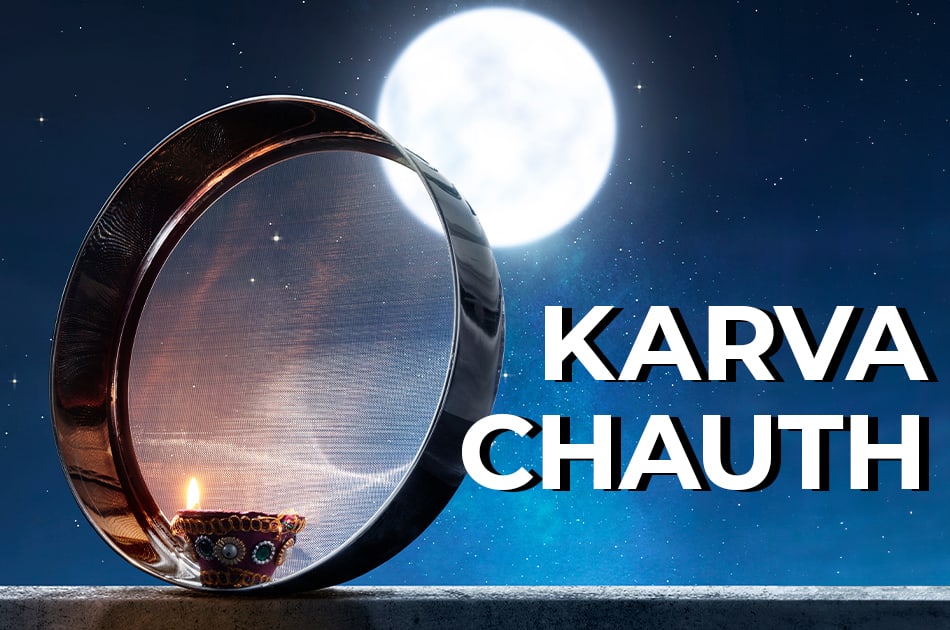Home > Our Blogs > Karwa Chauth 2025: Know the Significance of the Festival of Matrimony
Karwa Chauth 2025: Know the Significance of the Festival of Matrimony

Karwa Chauth is a notable festival celebrated on a grand scale by married Hindu women, particularly in the Northern region of the nation. This festival is a commemoration of marriage and the feeling of adoration and love between married couples.
The Karwa Chauth Vrat, or a full-day Vrat, holds paramount significance for married women, wherein they follow a Nirjala Vrat, which is a stern ritual of not eating or drinking anything, not even water for a complete day. This fast starts at sunrise and continues until the Moon is seen in the evening. Married women perform this rigorous ritual for the long life of their husbands.
When is Karwa Chauth Celebrated?Karwa Chauth fast is observed on the Krishna Paksha Chaturthin Tithin in the month of Kartik, as per the Purnimantra Calendar. According to the Amanta Calendar, in Maharashtra, in Gujarat, and Southern India, Karwa Chauth is celebrated during the Ashwin month. However, only the month’s name changes; it is celebrated on the same day across all states.
Furthermore, Karwa Chauth coincides with Sankashti Chaturthi, which is a day of fasting for the divine Lord Ganesha. And following the four days, the pious Ahoi Ashtami Vrat is observed by people for their sons’ well being.
Karwa Chauth 2025: Thu, 9 Oct, 2025, 10:54 pm - Fri, 10 Oct, 2025, 7:38 pm
The Significance of Karwa Chauth
This festival is known to honour the bond of love, togetherness that a married couple shares. Known as Karak Chathurthi, wherein the Karwa or Karak, meaning the ‘earthen pot’, is used to offer water to the Full Moon; this is called as Arghya. Chauth on the other hand means the ‘fourth day’. This Karwa is also important during the Karwa Chauth Pooja, which is offered as Daan (charity) to the Brahmin or any women that is eligible.
Women pray for their husband’s good health and overall well being on this occasion. It is dedicated to the long life of husbands. The festival requires a day-long strict fast. Women go through the day without consuming any food or a single drop of water. The fast comes to an end when the Moon is seen in the evening. Husbands, in return show their love and adoration to their wives by giving them gifts and bestowing affection.
It is believed that by observing the devout occasion, married women can ensure their husbands lead a happy and promising life. The preparations for the fast and the occasion commence at least a couple of days before the day of the festival. Women spent the day listening to the mythological stories linked with it.
Important Dos and Don’ts to Remember on Karwa Chauth 2025
Karwa Chauth is one of the most cherished festivals for married women, celebrated with devotion, tradition, and love. The highlight of the occasion lies in observing the fast, performing the Karwa Chauth Sargi ritual before sunrise, and the evening Puja that completes the day.
Dos on Karwa Chauth
1. Don’t Skip Sargi
The pre-dawn meal, or Sargi, is a crucial part of Karwa Chauth. Traditionally prepared by the mother-in-law for her daughter-in-law, Sargi is meant to keep you nourished and energetic throughout the day-long fast. Include foods rich in complex carbohydrates, proteins, and dry fruits, like sevaiyaan, mathri, and nuts, to prevent weakness, headaches, or dizziness later in the day.
2. Honor the First Karwa Chauth Ritual
For newlyweds, the first Karwa Chauth holds special importance. The bride is blessed by her family, and the mother-in-law personally gives her Sargi. It is considered a beautiful way of welcoming her into the family and strengthening the marital bond.
3. Apply Mehendi in Advance
Applying mehendi (henna) is a joyful tradition associated with Karwa Chauth. It is believed to bring happiness, prosperity, and deepen the bond between husband and wife. Apply it a day or two before the festival so the color darkens beautifully.
4. Dress Up Traditionally
This is the day to embrace vibrant ethnic wear. Women usually prefer red, green, or yellow outfits, as these shades symbolize love, prosperity, and harmony. Pair your attire with jewelry, a bindi, and elegant makeup to complete the look.
5. Wear the Mangalsutra
The mangalsutra, a sacred thread of marriage, should be worn on this day. It symbolizes the sanctity of marriage, love, and protection for the husband.
6. Break the Fast with Rituals
The fast is traditionally broken after sighting the moon. The wife drinks water (and sometimes eats the first morsel) from her husband’s hand. This ritual beautifully signifies love, respect, and the deep emotional connection between husband and wife.
Don’ts on Karwa Chauth
1. Avoid Black or White Clothes
Black is considered inauspicious in Hindu rituals, while white is traditionally associated with mourning. On Karwa Chauth, avoid these shades and instead choose bright festive colors.
2. Refrain from Using Sharp Objects
It is believed that married women should not use knives, scissors, or needles during the day of fasting.
3. Don’t Donate White Items
On this day, avoid donating white-colored items such as milk, rice, curd, clothes, or sweets, as these are considered inauspicious for Karwa Chauth.
4. Avoid Arguments or Negativity
The spirit of Karwa Chauth is about love, harmony, and togetherness. Refrain from arguing, quarreling, or hurting anyone, especially elders or your spouse. Stay calm, positive, and spread happiness throughout the day.
Don’t Overexert Yourself
Since you will be fasting without food and water, it’s important to avoid heavy physical activity. Rest when needed and keep your energy balanced to enjoy the occasion without discomfort.
Conclusion
Karwa Chauth is not just about fasting, it’s about love, blessings, and celebrating the sacred bond of marriage. By keeping these simple dos and don’ts in mind, you can observe the festival with devotion and joy, while ensuring a healthy, stress-free experience.
If you’d like to learn more about the rituals or seek personalised guidance for Karwa Chauth, connect with the astrologers at AstroReal for authentic insights.








Comments
No comments yet. Be the first to comment!


